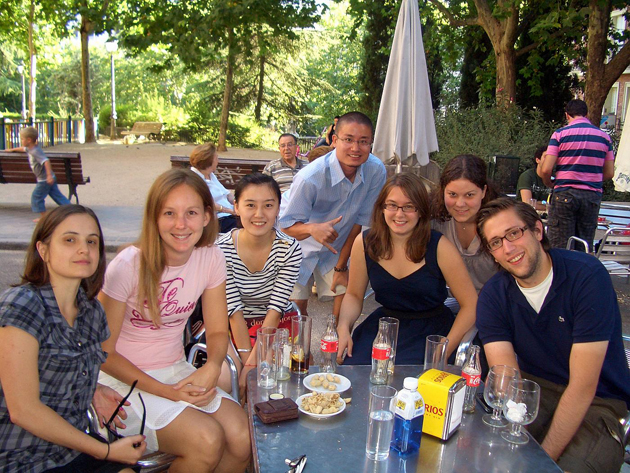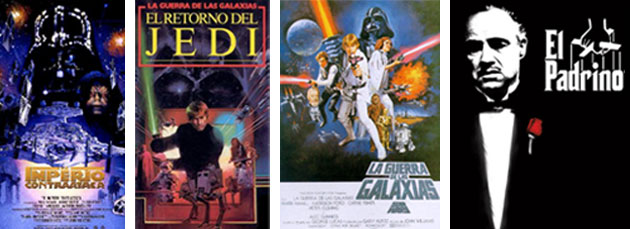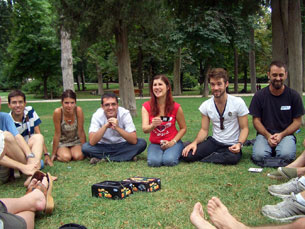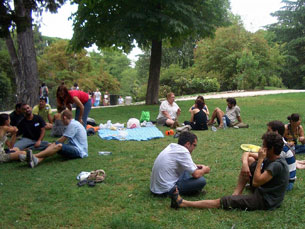
Trying to Become Fluent in Spanish
Posted on December 5, 2010 at 9:33pm Madrid / 3:33pm Cincinnati by Kelly Larbes

Before I came to Spain I made a goal to become fluent in four months. It was an arbitrary time period and the definition of fluent was pretty arbitrary too, but I wanted to have a goal. Fluent for me is being able to speak without fear of messing up (even though I will always make errors) and to be able to understand native speakers easily whether they are talking to me in person or on the phone or with each other at a million miles a minute.
So, it’s been five months now. Did I achieve my goal? No, not yet. Studying Spanish during high school and at university gave me a good start, but my biggest obstacle is still listening comprehension. I do pretty well in one-on-one conversations because people slow down for me. I get lost quickly when I am trying to understand a conversation between native speakers; they just speak so quickly and often don’t wait for each other to finish sentences. And the same thing happens when watching movies in Spanish. It often becomes a jumble.
Even though I am not quite where I want to be with comprehension, I have made some great improvements overall. I got over the fear hump! I speak without much apprehension. I still trip over my words, but I don’t let it stop me. I can have a conversation in Spanish for hours without a problem – though a bit of Spanglish is always thrown in. My vocabulary has markedly improved, but still has a long way to go. My comprehension is a little better, and the optimist in me says I will eventually get over that hump too, though most days it honestly doesn’t feel like it.
There are still so many things I want to accomplish with my Spanish. Here are some things I have been doing to improve my Spanish skills:
Spanish Classes
Shortly after we arrived in Spain, and before I started working, I took two weeks of intensive Spanish classes at Don Quijote language school. I took five hours of classes a day full of grammar, vocabulary, speaking, and culture. I was actually disappointed that most of my teachers seemed unprepared and taught straight from the book. My class had four teachers in our two weeks, so it was hard for them to get to know our needs. Though a good teacher would’ve been nice, it was still a great way to get my brain accustomed to speaking and hearing Spanish.
Since then I have been taking evening classes at CEE. It is ironic that CEE’s classes are remarkably more affordable, yet I feel like I have gotten so much more out of them. Classes are one hour a day and I usually attend three or four days a week depending on work and travel plans. I’ve had two different teachers. The first teacher I had was one of my favorite Spanish teachers I’ve ever had (after my high school teacher Señorita Bock). He really helped me understand a lot of grammar so I can better say what I intend to say in Spanish.
One of the best things about my Spanish classes are getting to know my classmates who come from all different parts of the world. Along with learning Spanish, I always get a few culture lessons from other countries too. I love learning the little idiosyncrasies. Just the other day I learned that most Europeans pronounce Nike as it would rhyme with bike or like. I’ve always heard my boss refer to it that way and I thought it was just his weird personal quirk. I had no idea it was a peculiarity of millions of people.
Language Exchanges
A language exchange or “intercambio” is a good way to practice speaking a language. I’d meet up with a native Spanish speaker who wanted to learn English and we’d speak in English half the time and Spanish the other half. Though work has put an end to the regularity of my language exchanges, I did quite a few when I first arrived and I met some great people.
I found language exchange partners online through Couchsurfing and Loquo. Jay and I also did a group language exchange through Couchsurfing, which felt like a mixture of speed dating and summer camp. We spoke with lots of different people and played word games.
I liked doing language exchanges because they were a good way to meet people and to have someone to ask all of my language questions. One of my language partner, Noelia, and I would keep a notebook and write down all of our questions that came up though the week. We’d usually walk through a park or the streets of Madrid and then find a bench on which to sit afterwards and ask all of our questions.
Work
Working in a mostly Spanish speaking environment may be doing the most for my Spanish skills. I have to use all of my skills at work. Though my boss speaks perfect English, I speak Spanish with everyone else. I learn vocab and grammar as I write presentations and review my colleagues’ corrections of my errors. I read briefs and write emails in Spanish.
I think my biggest challenges have been a few ideation work sessions recently. Anyone involved in work sessions knows that sometimes everyone seems to be talking at once and when this happens in Spanish I can’t understand a thing. Sometimes I just want to yell, “One at a time, please!”
These sessions are completely exhausting as I use all of my brain power just to keep up with what is going on and then try to contribute on top of that. The first time I spoke up was the most nerve racking experience. It’s one thing to have no fear in the grocery store; its another thing to speak up at work in front of a group of professionals who are all native Spanish speakers. After breaking the ice the first time, I’ve gotten over my fears. I know it’s the ideas that count and not my grammar mistakes.
Anki
I have been using the online program, Anki, to improve my vocabulary. Anki is a spaced repetition flashcard program. It is just like the hand-written flashcards I used back in elementary school for studying, except these are online and use an algorithm to strategically space out how often I see each card. I recommend Anki for anyone trying to learn a new language.
Reading
I usually read for a little bit before going to sleep, so I have been trying to stick to Spanish language books. I recently started reading Paulo Coelho’s El Peregrino on Jay’s Kindle. I was loving the embedded Spanish English dictionary we bought for the Kindle – I could just hover the cursor over a Spanish word that I did not know, and the English translation would automatically display along the bottom of the screen. It was so useful for learning new vocabulary. I hope the thieves that stole all of our stuff last weekend are enjoying it too (sarcasm).
Podcasts
My walk to work is about 30 minutes and I have found that Spanish Language podcasts are a great way to productively spend that time. I definitely think it is helping my listening comprehension. The podcasts have really brought to my attention how much different accents trip me up. Even though South American Spanish speakers are generally thought to speak clearer, I find them very difficult. I do the best with native Madrid speakers since that is what I am becoming accustomed to.
My favorite podcasts are Nómadas and Viajeros del Mundo, two travel podcasts that take me around the world. The vocabulary is usually pretty basic so I can follow the story and they always give me ideas for new places I want to visit.
Movies
I make an effort to watch movies in Spanish with English subtitles to try to help my listening comprehension. The English subtitles are there so Jay can understand the movie and so I don’t get completely lost, but I find that I just read instead of listen. I’m not quite sure how much help they are.
Regardless, this has been a good compromising tool for Jay and I. I never wanted to watch all of the Godfather and the Star Wars movies, but I agreed to do it if we could watch them in Spanish. The Spanish voices definitely add a comedic element to the movies for us.

I know that when I move back to Cincinnati many of these efforts will consequently fall off the list, but I hope I have enough willpower to keep up a lot of them so that I continually improve. At times I feel desperate about my lack of comprehension skills. I often feel like I am just hitting a brick wall. I’m always looking for new ideas to improve. Anyone have language learning advice that worked for them, whether in the native environment or at home?


Hey,
it’s a great post! I totally understand what you mean and how hard it is to speak a foreign language in front of many native speakers, but it’s awesome that you’ve mad such a progress in such a short time and you even speak Spanish at work! the post kind of motivated me to get going to my next language, because it is one of the greatest and most useful things to do 🙂
Btw, I also pronounce Nike the European way and didn’t have a clue it’s actually kind of incorrect until a couple of years ago :)))
Good post, lady! I think all the efforts you are making are fantastic! The Nike thing made me laugh, as most British people pronounce it to rhyme with bike. You should hear a British English speaker pronounce “adidas” – not even close to what we’re used to! 🙂
Milda – I am always amazed at people who can speak a handful of languages. You are amazing. What language is next?
Jen – I bet you get a big kick out of learning all of the British English language variations. My friends from Australia (when we were in Croatia) were always using crazy words. It’s always hard not to giggle a little when I hear Nike said rhyming with bike.
spanish is fun…